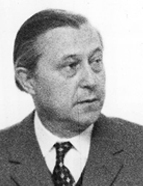

Hermann Kellenbenz was born on 28 August 1913 in the city of Süssen (formerly the kingdom of Würtemberg, now the state of Baden-Würtemberg in Germany). During his high school education in Göppingen (Würtemberg), Kellenbenz acquired self-taught knowledge of the Spanish language. He studied history, history of art, and history of literature at the universities of Tübingen, Munich, Kiel and Stockholm. In 1938 he received his doctorate from the University of Kiel (Schleswig-Holstein, Germany) with his dissertation (supervised by the theologian Otto Scheel) (1876-1954) on Swedish history and politics in the domain of Schleswsig-Gottorf in northern Germany, entitled Holstein-Gottorff, eine Domäne Schwedens. Ein Beitrag zur Geschichte der norddeutschen und nordeuropäischen Politik von 1657–1675 [Schleswig-Gottorf, a dominion of Sweden. A contribution to the history of the politics of northern Germany and northern Europe in the years 1657 – 1675], published in 1940.
After his doctorate, Kellenbenz worked at the Reichsinstitut für Geschichte des Neuen Deutschland [New Germany History Institute], where he took part in the research into the history of the Jews in the city of Hamburg (Germany). He was a soldier in the Second World War and was seriously wounded on the Eastern Front. He returned as a war invalid. He then began his university career and taught history at the universities of Regensburg (1948-1950) and Würzburg (1952-1957). Still in Würzburg, Kellenbenz presented his dissertation entitled Sephardim an der unteren Elbe. Ihre wirtschaftliche und politische Bedeutung vom Ende des 16. bis zum Beginn des 18. Jahrhunderts [Sephardic Jews located along the lower Elbe River. Their economic and political importance from the late 16th century to the early 18th century]. Even today this work is considered one of the most important on the subject of Jews of Spanish and Portuguese origin, largely due to its use of various European archival sources. During his research—first as part of a Rockefeller Foundation fellowship at the Research Centre for Entrepreneurial History at Harvard University (1952-1953) and then at the Ecole Practique des Hautes Etudes Paris VI [Escola Prática de Estudos de Alto Nível Paris VI] (1953-1954)—he collaborated with several international historians, such as Arthur H. Cole, Frederic C. Lane (USA), and Fernand Braudel (France). This collaboration continued until Kellenbenz's death.
This work is financed by national funds through FCT - Foundation for Science and Technology, I.P, in the scope of the projects UIDB/04311/2020 and UIDP/04311/2020.
